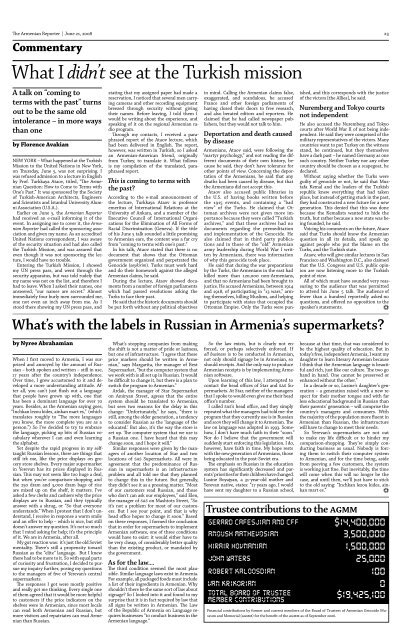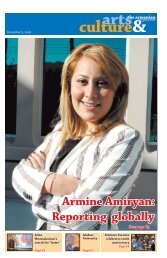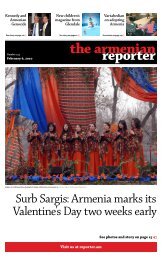Armenian Reporter
Armenian Reporter
Armenian Reporter
You also want an ePaper? Increase the reach of your titles
YUMPU automatically turns print PDFs into web optimized ePapers that Google loves.
The <strong>Armenian</strong> <strong>Reporter</strong> | June 21, 2008 23CommentaryWhat I didn’t see at the Turkish missionA talk on “coming toterms with the past” turnsout to be the same oldintolerance – in more waysthan oneby Florence AvakianNew York – What happened at the TurkishMission to the United Nations in New York,on Thursday, June 5, was not surprising. Iwas refused admission to a lecture in Englishby Prof. Turkkaya Ataov, titled, “The <strong>Armenian</strong>Question: How to Come to Terms withOne’s Past.” It was sponsored by the Societyof Turkish-American Architects, Engineersand Scientists and Istanbul University AlumniAssociation (U.S.A.).Earlier on June 5, the <strong>Armenian</strong> <strong>Reporter</strong>had received an e-mail informing it of theevent. In assigning me to cover it, the <strong>Armenian</strong><strong>Reporter</strong> had called the sponsoring associationand given my name. As an accreditedUnited Nations correspondent, I was awareof the security situation and had also calledthe Turkish Mission, and was assured thateven though it was not sponsoring the lecture,I would have no trouble.Entering the Turkish Mission, I showedmy UN press pass, and went through thesecurity apparatus, but was told rudely thatmy name was not on the list, and therefore Ihad to leave. When I asked their names, oneanswered, “our names are secret.” Almostimmediately four burly men surrounded me,one not even an inch away from me. As Istood there showing my UN press pass, andstating that my assigned paper had made areservation, I noticed that several men carryingcameras and other recording equipmentbreezed through security without givingtheir names. Before leaving, I told them Iwould be writing about the experience, andspeaking of it on the regional <strong>Armenian</strong> radioprogram.Through my contacts, I received a paraphrasedreport of the Ataov lecture, whichhad been delivered in English. The report,however, was written in Turkish, so I askedan <strong>Armenian</strong>-American friend, originallyfrom Turkey, to translate it. What followsis my compilation of the translated, paraphrasedreport.This is coming to terms withthe past?According to the e-mail announcement ofthe lecture, Turkkaya Ataov is professoremeritus of International Relations at theUniversity of Ankara, and a member of theExecutive Council of International Organizationsfor the Elimination of All Forms ofRacial Discrimination (Geneva). If the titleof his June 5 talk sounded a little promisingto <strong>Armenian</strong> ears, the content was a far cryfrom “coming to terms with one’s past.”In his talk, Ataov stated that there is nodocument that shows that the Ottomangovernment organized and perpetrated theGenocide (soykirim). Turks must work hardand do their homework against the alleged<strong>Armenian</strong> claims, he said.During the lecture, Ataov showed documentsfrom a number of foreign parliamentswhich had passed resolutions asking theTurks to face their past.He said that the historic documents shouldbe put forth without any political objectivesin mind. Calling the <strong>Armenian</strong> claims false,exaggerated, and scandalous, he accusedFrance and other foreign parliaments ofhaving closed their doors to free research,and also berated editors and reporters. Heclaimed that he had called newspaper publishers,but they would not talk to him.Deportation and death causedby disease<strong>Armenian</strong>s, Ataov said, were following the“martyr psychology,” and not reading the differentdocuments of their own history, becausehe said, they don’t have tolerance forother points of view. Concerning the deportationof the <strong>Armenian</strong>s, he said that anydeaths had been caused by disease, but thatthe <strong>Armenian</strong>s did not accept this.Ataov also accused public libraries inthe U.S. of having books written beforethe 1915 events, and containing a “badview” of the Turks. He claimed that Ottomanarchives were not given more importancebecause they were called “Turkisharchives,” and that these archives had nodocuments regarding the premeditationand implementation of the Genocide. Healso claimed that in third party publicationsand in those of the “old” <strong>Armenian</strong>army leadership during World War I writtenby <strong>Armenian</strong>s, there was informationof why this genocide took place.He said that during the war preparationsby the Turks, the <strong>Armenian</strong>s in the east hadkilled more than 120,000 non-<strong>Armenian</strong>s,and that no <strong>Armenian</strong>s had been brought tojustice. He accused <strong>Armenian</strong>s, between 1914and 1918, of participating in “13 wars,” armingthemselves, killing Muslims, and helpingto participate with states that occupied theOttoman Empire. Only the Turks were punished,and this corresponds with the justiceof the victors [the Allies], he said.Nuremberg and Tokyo courtsnot independentHe also accused the Nuremberg and Tokyocourts after World War II of not being independent.He said they were comprised of themilitary representatives of the victors. Manycountries want to put Turkey on the witnessstand, he continued, but they themselveshave a dark past – he named Germany as onesuch country. Neither Turkey nor any othercountry should be chosen as a scapegoat, hedeclared.Without saying whether the Turks wereguilty of genocide or not, he said that MustafaKemal and the leaders of the Turkishrepublic knew everything that had takenplace, but instead of getting stuck in the past,they had constructed a new future for a newgeneration. This denied that this was donebecause the Kemalists wanted to hide thetruth, but rather because a new state was beingfounded, he said.Voicing his comments on the future, Ataovsaid that Turks should know the <strong>Armenian</strong>question in all its details, and speak upagainst people who put the blame on theTurks, and the Turkish state.Ataov, who will give similar lectures in SanFrancisco and Washington D.C., also claimedthat the U.S. Congress and U.S. public opinionare now listening more to the Turkishpoint of view.All of which must have sounded very reassuringto the audience that was permittedto attend his June 5 talk. The audience offewer than a hundred reportedly asked noquestions, and offered no opposition to thespeaker’s statements.fWhat’s with the labels in Russian in Armenia’s supermarkets?by Nyree AbrahamianWhen I first moved to Armenia, I was surprisedand annoyed by the amount of Russian– both spoken and written – still in use,17 years after the country’s independence.Over time, I grew accustomed to it and developeda more understanding attitude. Afterall, you can’t just flush out a languagethat people have grown up with, one thathas been a dominant language for over 70years. Besides, as the <strong>Armenian</strong> saying goes,“Inchkan lezou kides, ainkan mart es,” (whichtranslates roughly to “The more languagesyou know, the more complete you are as aperson.”) So I’ve decided to try to embracethe language, picking up bits of Russian vocabularywherever I can and even learningthe alphabet.Yet despite the rapid progress in my selftaughtRussian lessons, there are things thatstill irk me, like the price displays on grocerystore shelves. Every major supermarketin Yerevan has its prices displayed in Russian.This may not seem like too huge a deal,but when you’re comparison-shopping andthe 250 dram and 3,000 dram bags of riceare mixed up on the shelf, it matters. I’veasked a few clerks and cashiers why the pricedisplays are in Russian, and they typicallyanswer with a shrug, or “So that everyoneunderstands.” When I protest that I don’t understand,I receive in response a warm smileand an offer to help – which is nice, but stilldoesn’t answer my question. It’s not so muchthat I mind asking for help; it’s the principleof it. We are in Armenia, after all.My gut reaction was: it’s just the old Sovietmentality. There’s still a propensity towardRussian as the “elite” language. But I knewthere had to be more to it. So with equal partsof curiosity and frustration, I decided to pursuemy inquiry further, posing my questionsto the managers of five of Yerevan’s centralsupermarkets.The responses I got were mostly positiveand really got me thinking. Every single oneof them agreed that it would be more helpfulto customers if the price indicators on theshelves were in <strong>Armenian</strong>, since most localscan read both <strong>Armenian</strong> and Russian, butmore visitors and repatriates can read <strong>Armenian</strong>than Russian.What’s stopping companies from makingthe shift is not a matter of pride or laziness,but one of infrastructure. “I agree that theseprice markers should be written in <strong>Armenian</strong>,”says Margarita, the manager of BestSupermarket, “but the computer system thatwe work with is all set up in Russian. It wouldbe difficult to change it, but there is a plan toswitch the program to <strong>Armenian</strong>.”Ardak, the manager of Star Supermarketon Amiryan Street, agrees that the entiresystem should be translated to <strong>Armenian</strong>,but sees two reasons for the delay in thischange: “Unfortunately,” he says, “there isstill, among the older generation, a tendencyto consider Russian as the ‘language of theeducated.’ But also, it’s the way the store isset up. The computer system that we use isa Russian one. I have heard that this maychange soon, and I hope it will.”Similar responses were given by the managersof another location of Star and twolocations of SAS Supermarkets. All were inagreement that the predominance of Russianin supermarkets is an infrastructureproblem and all told me that they plannedto change this in the future. But generally,they didn’t see it as a pressing matter. “Mostof our customers read Russian, and thosewho don’t can ask our employees,” said Elen,the manager of SAS on Mashtots Street, “Soit’s not a problem for most of our customers.But I see your point, and that is whyhead office hopes to change it soon.” Basedon these responses, I formed the conclusionthat in order for supermarkets to implement<strong>Armenian</strong> software, one of three conditionswould have to exist: it would either have tobe very cheap, of considerably better qualitythan the existing product, or mandated bythe government.As for the law....The third condition seemed the most plausible.Similar language laws exist in Armenia.For example, all packaged foods must includea list of their ingredients in <strong>Armenian</strong>. Whyshouldn’t there be the same sort of law aboutsignage? So I looked into it and found to mysurprise that it is in fact required by law thatall signs be written in <strong>Armenian</strong>. The Lawof the Republic of Armenia on Language requiresbusinesses “to conduct business in the<strong>Armenian</strong> language.”So the law exists, but is clearly not enforced,or perhaps selectively enforced. Ifall business is to be conducted in <strong>Armenian</strong>,not only should signage be in <strong>Armenian</strong>, soshould receipts. And the only way to produce<strong>Armenian</strong> receipts is by implementing <strong>Armenian</strong>software.Upon learning of this law, I attempted tocontact the head offices of Star and SAS Supermarkets.At Star, neither of the managersthat I spoke to would even give me their headoffice’s number.I called SAS’s head office, and they simplyrepeated what the managers had told me: theprogram that they currently use is in Russianand soon they will change it to <strong>Armenian</strong>. Thelaw on language was adopted in 1993. Somehow,I don’t have much faith in their “soon.”Nor do I believe that the government willsuddenly start enforcing this legislation. I do,however, have faith in time. My hope restswith the new generation of <strong>Armenian</strong>s, thosebeing educated in the post-Soviet era.The emphasis on Russian in the educationsystem has significantly decreased and parents’priorities for their children have changed.Lusine Boyajyan, a 31-year-old mother andYerevan native, states: “17 years ago, I wouldhave sent my daughter to a Russian school,because at that time, that was considered tobe the highest quality of education. But intoday’s free, independent Armenia, I want mydaughter to learn literary <strong>Armenian</strong> becauseI think that the <strong>Armenian</strong> language is beautifuland rich, just like our culture. The two gohand in hand. One cannot be preserved orenhanced without the other.”In a decade or so, Lusine’s daughter’s generation– a generation raised with a new respectfor their mother tongue and with farless educational background in Russian thantheir parents’ generation – will comprise thecountry’s managers and consumers. Withthe majority of the population more fluent in<strong>Armenian</strong> than Russian, the infrastructurewill have to change to meet their needs.So Yerevan’s supermarkets are not outto make my life difficult or to hinder mycomparison-shopping. They’re simply conductingbusiness as usual. Nobody is forcingthem to switch their computer systemto <strong>Armenian</strong>, and for the time being, asidefrom peeving a few customers, the systemis working just fine. But inevitably, the timewill come when this will no longer be thecase, and until then, we’ll just have to stickto the old saying: “Inchkan lezou kides, ainkanmart es.”fTrustee contributions to the AGMMFinancial contributions by former and current members of the Board of Trustees of <strong>Armenian</strong> Genocide Museumand Memorial (AGMM) for the benefit of the AGMM as of September 2006.

















